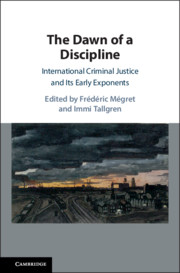Book contents
- Reviews
- The Dawn of a Discipline
- The Dawn of a Discipline
- Copyright page
- Contents
- Contributors
- Foreword
- 1 Introduction
- 2 Hugh H. L. Bellot
- 3 Vespasian V. Pella
- 4 Emil Stanisław Rappaport
- 5 International Criminal Justice as Universal Social Defence
- 6 Henri Donnedieu de Vabres
- 7 Not Just Pure Theory
- 8 Principled Pragmatist?
- 9 Retelling Radha Binod Pal
- 10 Aron Trainin
- 11 The Complex Life of Rafal Lemkin
- 12 Stefan Glaser
- 13 Yokota Kisaburō
- 14 Jean Graven
- 15 Absent or Invisible?
- Index
9 - Retelling Radha Binod Pal
The Outsider and The Native
Published online by Cambridge University Press: 04 September 2020
- Reviews
- The Dawn of a Discipline
- The Dawn of a Discipline
- Copyright page
- Contents
- Contributors
- Foreword
- 1 Introduction
- 2 Hugh H. L. Bellot
- 3 Vespasian V. Pella
- 4 Emil Stanisław Rappaport
- 5 International Criminal Justice as Universal Social Defence
- 6 Henri Donnedieu de Vabres
- 7 Not Just Pure Theory
- 8 Principled Pragmatist?
- 9 Retelling Radha Binod Pal
- 10 Aron Trainin
- 11 The Complex Life of Rafal Lemkin
- 12 Stefan Glaser
- 13 Yokota Kisaburō
- 14 Jean Graven
- 15 Absent or Invisible?
- Index
Summary
Radha Binod Pal (1886–1967) was an Indian judge appointed to the international Military Tribunal of the Far East (IMTFE). Sent in as a representative for the British Commonwealth prior to India’s independence, Pal wrote an extensive dissent rejecting the IMTFE as an intrument of victor’s justice. This chapter is divided into five parts and examines the significance of Radha Binod Pal and his dissent to the history and continuity of colonial hegemony in international criminal law and its institutions. The first part articulates the relevance of revisiting Pal’s dissent at this time. The second looks at Pal’s early years and his encounter with international law before and after the dissent. The third locates Pal in the historical-social context of colonial India. In part four, we look at the dissenting judgment, particularly his use of law as a technique despite the absence of any formal Western training in international law. This part also tries to respond to some of the critiques of the dissent. We conclude with a sketch of Pal as an ancestral voice in the critique of international criminal justice and as a proto-ideologue of Third World Approaches to International Law.
- Type
- Chapter
- Information
- The Dawn of a DisciplineInternational Criminal Justice and Its Early Exponents, pp. 230 - 259Publisher: Cambridge University PressPrint publication year: 2020

